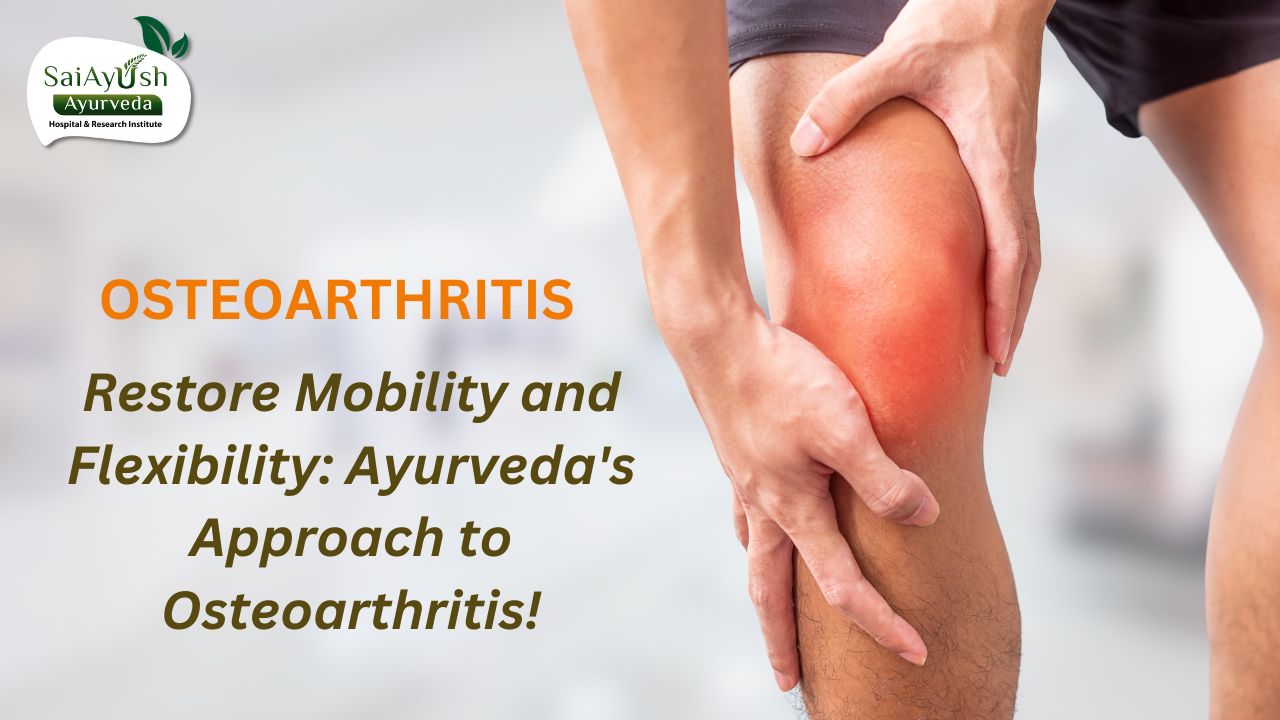What is Osteoarthritis?
Osteoarthritis, also referred to as degenerative joint disease, is a long-term condition that mainly affects the joints. When the protective cartilage that cushions the ends of bones gradually deteriorates over time, it causes pain, stiffness, and decreased joint mobility. Osteoarthritis most commonly affects weight-bearing joints like the knees, hips, and spine.
Causes of Osteoarthritis:
- While the exact cause of osteoarthritis remains unknown, several factors contribute to its development. The most prominent factors include:
- Age: The risk of developing osteoarthritis increases with age as the wear and tear on joints accumulates over time.
- Obesity: Excess weight puts excessive stress on the joints, accelerating the breakdown of cartilage.
- Joint injuries: Previous joint injuries or surgeries can increase the likelihood of developing osteoarthritis in the affected area.
- Genetics: Certain genetic factors may make individuals more susceptible to osteoarthritis.
- Joint overuse: Repetitive stress on joints due to certain occupations or sports activities can lead to osteoarthritis.
Signs and Symptoms of Osteoarthritis:
Recognizing the signs and symptoms of osteoarthritis is crucial for early intervention. Look out for the following indicators:
- Joint pain: Persistent pain during or after movement is a common symptom of osteoarthritis.
- Stiffness: Joints may feel stiff, especially after periods of inactivity, such as waking up in the morning.
- Reduced flexibility: Decreased range of motion and difficulty performing daily activities like bending, kneeling, or climbing stairs
- Joint swelling: In some cases, joints may appear swollen or feel tender to the touch.
- Joint instability: A sensation of joints giving way or feeling loose.
Ayurvedic Perspective on Osteoarthritis:
According to Ayurveda, osteoarthritis is primarily associated with an imbalance in the Vata dosha, which governs movement and joint health. When Vata becomes aggravated, it leads to dryness, roughness, and degeneration of the joints. Pitta dosha, responsible for metabolism and inflammation, can further exacerbate the condition by promoting inflammation and degeneration. Kapha dosha, associated with stability and structure, may also contribute to the progression of osteoarthritis through its tendency to result in increased tissue growth and decreased joint mobility. By understanding the specific role of each dosha in osteoarthritis, Ayurvedic practitioners are able to tailor their diagnosis and treatment approach to address the underlying imbalances and alleviate the symptoms of the condition.
Ayurvedic Management of Osteoarthritis:
Panchakarma: This Ayurvedic detoxification therapy helps remove accumulated toxins and promotes joint rejuvenation. Panchakarma not only provides symptomatic relief for osteoarthritis but also addresses the underlying causes of the disease, thus promoting long-term healing. Panchakarma treatments like Abhyanga (therapeutic massage), Swedana (herbal steam therapy), and Basti (medicated enema) can bring relief from pain and inflammation.
Herbal Remedies: Ayurvedic herbs like Shallaki (Boswellia serrata), Guggulu (Commiphora mukul), and Ashwagandha (Withania somnifera) are known for their anti-inflammatory and analgesic properties. These herbs, along with others, can be prescribed to reduce pain, inflammation, and joint stiffness.
The Role of Diet in Managing Osteoarthritis: Foods to Include and Avoid:
In managing osteoarthritis, it is crucial to consider the role of diet in alleviating symptoms and promoting joint health. Including foods rich in omega-3 fatty acids, such as fatty fish like salmon, mackerel, and sardines, can help reduce inflammation and relieve joint stiffness. Additionally, foods containing antioxidants, like fruits and vegetables, can help protect joint tissues from oxidative stress. On the other hand, it is equally important to avoid foods that can worsen inflammation and contribute to weight gain, as excess weight can increase the stress on weight-bearing joints. Foods high in saturated fats, refined sugars, and processed carbohydrates should be limited to prevent inflammation and maintain a healthy weight. By carefully selecting the right foods to include and avoiding those that can exacerbate symptoms, individuals with osteoarthritis can effectively manage their condition and improve their overall quality of life.
Lifestyle Modifications to Alleviate Osteoarthritis Symptoms: Exercise, Weight Management, and Stress Reduction
Exercise, weight management, and stress reduction are crucial lifestyle modifications for individuals looking to alleviate the symptoms of osteoarthritis. Regular exercise is not only essential for weight management but also helps to improve joint flexibility, strengthen muscles, and reduce pain and stiffness. Low-impact exercises, such as swimming, cycling, and yoga, are particularly beneficial for individuals with osteoarthritis as they put less stress on the joints.
Additionally, maintaining a healthy weight is important as excess body weight places added strain on the joints, exacerbating symptoms. Weight management through a balanced diet and portion control can help reduce pain and improve joint function.
Lastly, stress reduction techniques such as yoga, meditation, and deep breathing exercises can have a positive impact on osteoarthritis symptoms by promoting relaxation and reducing overall tension in the body. By adopting these lifestyle modifications, individuals with osteoarthritis can experience a significant improvement in their quality of life and better manage their condition.
Possibility of Cure with Ayurveda:
While a complete cure may not be possible in the advanced stages of osteoarthritis, Ayurveda aims to manage the condition effectively, slow down its progression, and improve the quality of life. Ayurvedic treatments, along with lifestyle modifications and appropriate self-care, can alleviate pain, improve joint function, and provide long-term relief.
Conclusion:
Osteoarthritis is a prevalent condition that affects millions worldwide, but it doesn’t have to dictate your life. By understanding the causes, recognizing the signs and symptoms, and embracing Ayurvedic principles, you can take proactive steps to manage osteoarthritis effectively with the help of doctors at Sai Ayush Ayurveda. With Ayurveda’s holistic approach and personalized treatment plans provided by our expert practitioners, you can experience relief, improve joint health, and enjoy a fulfilling, pain-free life once again.
Discover the healing power of Ayurveda with our latest article at Sai Ayush Ayurveda Hospitals! Dive into the age-old wisdom that can rejuvenate your body and mind. Click here to read more:



0 Comments